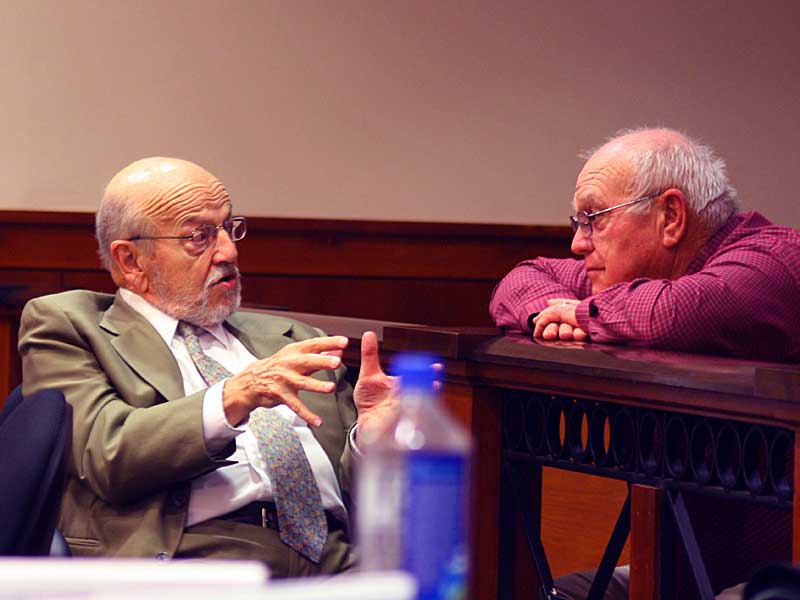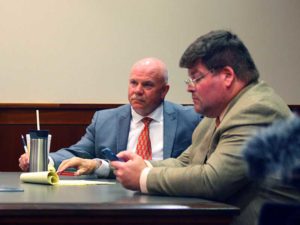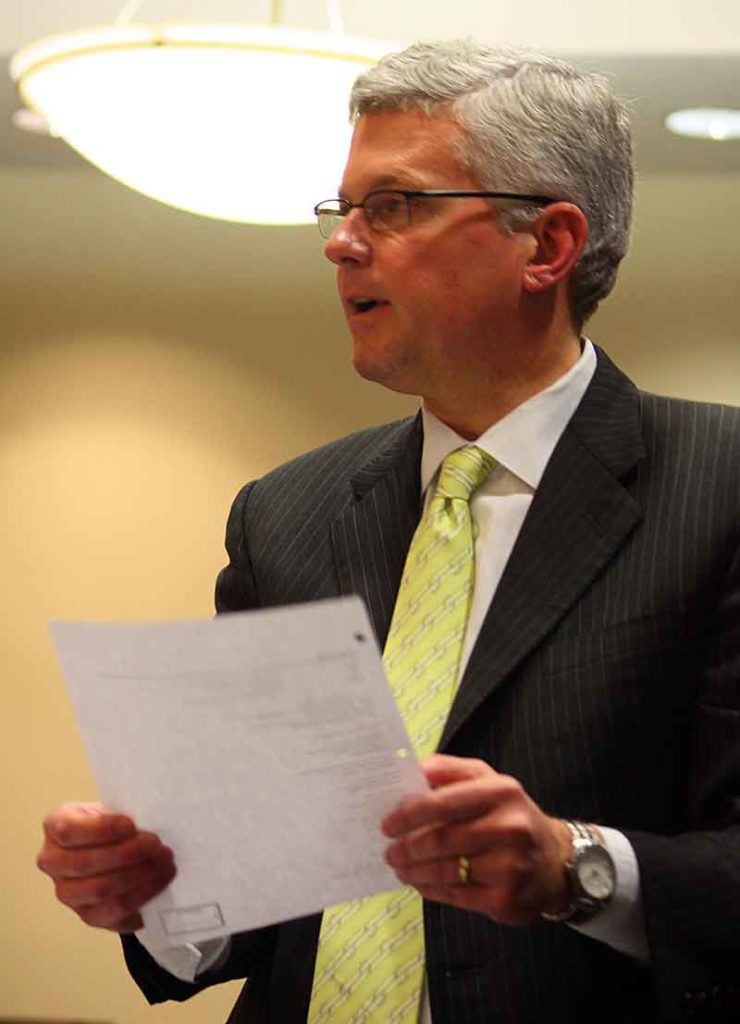Hubbard: Royalty’s challenge of removal hearing process unresolved – for now

Attorney Doug Hubbard talks with C.R. Royalty, John Royalty’s father, during a break in the public hearing held April 12-13 that ended with the Bardstown City Council voting to remove the mayor.
By JIM BROOKS
Nelson County Gazette / WBRT Radio
Sunday, April 30, 2017, 6:30 p.m. — When discussing the recent hearing that removed Bardstown Mayor John Royalty from office, attorney Doug Hubbard — one of Royalty’s defense attorneys — did not mince words.
The desired result — removing the mayor — was pre-ordained, Hubbard matter-of-factly told a group of journalists visiting his office.
“This was a well-conceived scheme by [the council’s investigator, Lexington attorney Scott Crosbie] — it was designed to do exactly what it did — make sure John had no chance,” he said. “It was unanimous before they ever brought the charges.”
In this case, Hubbard said it was clear “you don’t let the truth get in the way of what you want done.”
“The investigation was just a sham to collect enough evidence on which to make it look legal,” Hubbard said. Of the investigation’s final 44-page report, Hubbard noted that “most of it is opinion, and much of it is wrong.”
Hubbard made his comments critical of he Bardstown City Council’s handling of the recent hearing to remove Mayor John Royalty in a meeting with local journalists last Tuesday afternoon.
Hubbard’s law firm, Fulton Hubbard and Hubbard, represented former Mayor John Royalty at his removal hearing. Prior to the hearing, the firm filed a lawsuit challenging the constitutionality of the state law governing the hearing, and unsuccessfully tried to delay the hearing.
Nelson Circuit Court Judge Charles Simms denied the request to stop or delay the hearing.
According the firm’s lawsuit filed on Royalty’s behalf, the state law governing the removal of a mayor — KRS 83A.040 — only states that a mayor accused of wrongdoing has the right to a “full public hearing.”
But the statute is a seldom-used one, and Hubbard said it appears it was designed “so the six members of the city council can get rid of the mayor anytime they want to.”
In this case, the council hired the investigator; the council brought the charges against the mayor; the council hired the hearing officer; the council scheduled the hearing. At that hearing, the council sat in judgment of the mayor.
The public hearing called for in KRS is an administrative one, but Hubbard said the process has so many flaws “it makes no sense.”
“It doesn’t give your people the right to confront their accusers and you don’t guarantee them due process.”
The way Royalty’s hearing was set up “lacked common decency,” Hubbard said.
Despite the fact the council knew Royalty had legal representation, his attorneys were never consulted in regard to scheduling a hearing or selecting a hearing officer. Royalty’s defense team was unable to see the hearing officer — former Circuit Judge Doughlas “Dodie” George — until 48 hours before the hearing began.
Not only did the timing of the hearing deny Royalty’s attorneys sufficient time to investigate the findings and subpoena witnesses, they were also barred from calling the council’s investigator — attorney Scott Crosbie — and members of the city council as witnesses.

Former Mayor John Royalty listens to testimony during the public hearing that ended with the Bardstown City Council’s unanimous vote to remove him.
But Hubbard said he wasn’t blaming the city council for the removal process “being the mess I consider it to be.”
“The council was elected and have a right to do what they want to do,” he said.
As of last week, Royalty had not advised his attorneys of plans to file an appeal, despite a Louisville TV station’s report he had already done so.
Challenging the constitutionality of the state law governing the removal process is unlikely to be decided quickly, Hubbard said. Those challenges typically are decided by the state court of appeals or state supreme court — appeals that can languish in the court system for years, he said.
With the questions of the constitutionality of the state statute, Hubbard said there may be movement by the General Assembly to examine the law, he said.
“I think certainly there will be a movement to try to get something done in the legislature, but that doesn’t go back and correct what happened to John.”
Due to the length of time an appeal can take, it is unlikely Royalty could win an appeal and regain his seat as mayor before his original term ends, Hubbard said.
“But an appeal is the only way he’s ever going to have it established that this was a scheme with no merit,” he said. “The only way he can get his reputation back is by appealing it and winning.
“If I was one of the 1,900 who voted for John Royalty to beat Bill Sheckles — who only had 1,400 votes — I would be concerned about how the hell these six people (the Bardstown City Council) can put out the guy I elected.”
-30-







